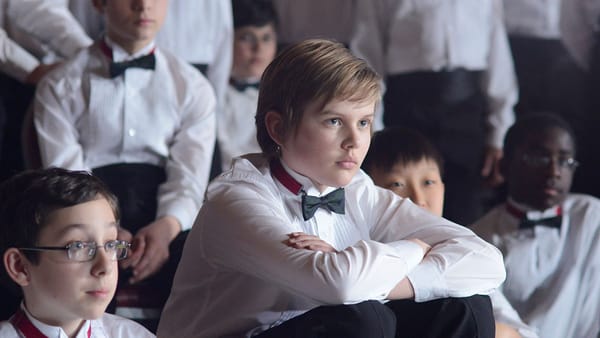Borrowed lives, real hurt, and the strange economics of belonging.

Some films announce themselves with force, and some slip in like a stranger sitting next to you on a train — unassuming at first, and then strangely impossible to shake.
RENTAL FAMILY is the latter. It’s not loud, not aggressively quirky, not engineered for prestige season the way most actor-centric dramas tend to be. Instead, it settles into your mind with a kind of gentle persistence, the way memories do when they’re tinged with both sadness and softness.
Brendan Fraser plays Phil, a washed-out American actor trying not to drown in Tokyo — working odd jobs, floating through expat circles, and quietly losing the thread of his own life. When he accepts a job at a “rental family” agency — where people can hire actors to play spouses, parents, children, or friends — the film finds its emotional backbone. What begins as an absurd gig slowly becomes a mirror held up to Phil’s own longing for connection, identity, and relevance.
Fraser is phenomenal here, not in the showboating sense, but in the subtle way he carries disappointment in his body language. Phil walks through the city like a man afraid to take up space, a foreigner twice over: outsider to Japan and outsider to his own life. Fraser plays him with tiny fractures — the nervous smile that doesn’t reach the eyes, the pauses where he seems to forget what confidence feels like. It’s the best kind of acting: lived-in, wounded, humble.
The film understands Tokyo deeply — not as neon spectacle, but as a city of quiet loneliness and social choreography. Hikari shoots the streets, trains, and apartments with affection and precision, making the rental-family industry feel both surreal and heartbreakingly plausible. This is Japan not as an exotic backdrop, but as a cultural ecosystem where loneliness has become an industry and emotional labor is outsourced just like everything else.
Phil’s assignments form the emotional anthology of the film. Playing a father to a young girl in need of stability, serving as a companion to adults who’ve forgotten how to talk to someone who isn’t obligated to stay, performing roles everyone else treats seriously even as he reminds himself it’s “just a job.” Each scenario deepens the question that sits at the core of the story: if the connection is purchased, does that make it less real?
The supporting cast builds the film’s emotional architecture. Takehiro Hira is excellent as the agency owner — pragmatic, warm, and quietly haunted. Mari Yamamoto brings depth as Phil’s colleague, someone who understands the work with a clarity he lacks. And young Shannon Mahina Gorman is a standout, anchoring the film’s most tender subplot with a performance so honest it threatens to break the film’s polished surface.
The film’s weakness lies in its neatness. RENTAL FAMILY sometimes prefers sentiment to discomfort, smoothing emotional splinters that would have given the story richer texture. It’s not afraid of pain, but it does occasionally step around the darker corners of identity, commodification, and transactional affection. Some scenes feel engineered to uplift where they could have complicated instead.
But Hikari’s sincerity rescues the film from predictability. There’s generosity in the storytelling, a respect for both the clients who hire surrogate families and the performers who embody them. The film doesn’t mock the practice; it investigates the humanity inside it. And in doing so, it reveals something rare: a world where people seek comfort not because they are weak, but because being alive — especially alone — is hard.
What elevates RENTAL FAMILY beyond a standard dramedy is how it handles performance. Phil’s job forces him to ask who he is when he isn’t acting — and whether the version of himself he shows to strangers might be more authentic than the one he shows to himself. The movie treats acting not as artifice but as possibility. Every role Phil plays is a door he might walk through toward becoming someone better.
By the time the film reaches its conclusion, RENTAL FAMILY lands on a truth gentler and more profound than its premise suggests: that sometimes the people who step into our lives for temporary roles end up leaving permanent marks. That found family doesn’t need to be earned through blood or history. And that even those who feel unworthy of connection can stumble into it and discover they needed it all along.
It’s a warm film. A tender one. Occasionally too tidy, but always honest in spirit. A story about a man paid to care — who ends up caring anyway. A story about a city that makes room for loneliness — and the tiny miracles that grow inside it. A story about the roles we perform for others, and the selves we slowly grow into when someone looks back at us like we matter.
In a cinematic landscape obsessed with big swings, RENTAL FAMILY wins by going small — and meaning it.




